WMG News
Flagship Coventry transport project takes a major step forward to net zero
- Real-world urban highway demo site of innovative rail track system for Coventry Very Light Rail (CVLR) unveiled on University of Warwick campus
- Testing facility will allow simulation of various scenarios, enabling active engagement with key stakeholders including utility companies and city transport planners
- WMG and Ingerop engineers have capitalised on advanced material and manufacturing processes developed over recent years
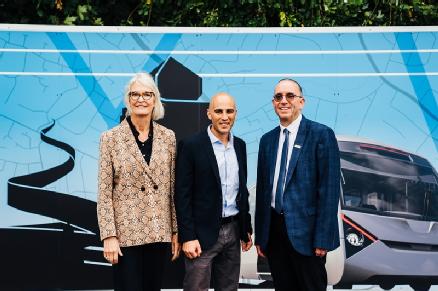 The Coventry Very Light Rail Project (CVLR) has taken a major step forward, as Coventry City CouncilLink opens in a new window and WMG, at the University of Warwick, launch a real-world demo site for its light rail track system.
The Coventry Very Light Rail Project (CVLR) has taken a major step forward, as Coventry City CouncilLink opens in a new window and WMG, at the University of Warwick, launch a real-world demo site for its light rail track system.
The site, based at WMG, University of Warwick, gives stakeholders a snapshot of what’s to come in Coventry, when the first phase of the city route commences.
Using advanced material and manufacturing processes, researchers and engineers at WMG have worked alongside track-design experts at IngeropLink opens in a new window to create, design and build the demo site including the unique track system, which is not only more affordable to install but also enables rapid installation - minimising disruption to local properties and businesses.
The track form, designed to sit within the top 30cm of existing highway surfaces, is easy to install and can be removed rapidly; significantly reducing clashes with utilities and potentially saving millions of pounds otherwise spent on excavation and moving gas, electrical and telecommunication systems when installing more traditional track forms. With installation costed at approximately £10m per km, the track is significantly cheaper compared to current tram tracks which can cost upwards of £25m per km, and significantly more in city centre locations.
The new track has been developed in parallel to a zero-emission, battery-powered lightweight shuttle vehicle created in partnership with TDi. The vision of Coventry Very Light Rail is that as technology matures it will become autonomous and work similarly to the London Underground system, where service is frequent and passengers can hop on and off.
The vehicle itself is lightweight, and there will be no overhead power supply along the route, significantly reducing infrastructure costs, complexity and visual impact on the city-scape.
Councillor Jim O’Boyle, Cabinet Member for Jobs, Regeneration and Climate Change, said: “This new track test site is a key part of our work to demonstrate the viability of the breakthrough technology in this track. In a world first, we’re aiming to keep pipes and cables in the ground, lowering installation costs and making Coventry Very Light Rail possible in our city and across the country.
“Coventry Very Light Rail will form the backbone of our future transport network, but we’re investing in many projects to make our city’s transport cleaner, greener and more convenient for residents. Coventry Very Light Rail will fit seamlessly with our plans to be the UK's first all-electric bus city and our plans to continue to provide more on-street electric charge points than anywhere outside London.”
Following installation at the University of Warwick, Coventry City Council will install test track at its Whitley Depot waste facility to test it with heavy goods vehicles, and also at the Very Light Rail National Innovation Centre (VLRNIC) in Dudley, where vehicle testing is currently taking place. The installation will form part of the facility’s 15m radius loop, built to test the CVLR prototype vehicle’s cornering system and will enable full system integration testing to be undertaken.
Dr Christopher Micallef, Principal Engineer at WMG, University of Warwick comments: “The University of Warwick urban track demonstration site provides an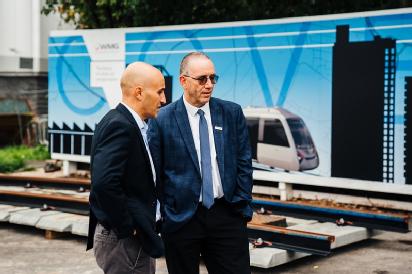 ideal scenario to prove-out the installation methods of the novel track system. The site will enable various competing sub-systems such as the encapsulation and pavement systems to be trialled to further explore the advantages and challenges.
ideal scenario to prove-out the installation methods of the novel track system. The site will enable various competing sub-systems such as the encapsulation and pavement systems to be trialled to further explore the advantages and challenges.
“The site includes features such as water drainage gullies, buried utilities and a sewage access chamber to ensure that solutions to these real-world complexities can be explored. After the first phase, which is all about the track installation process, the site will be further utilised to allow various scenarios to be simulated and enable active engagement with key stakeholders such as utility companies, materials and subsystems supply chain and city transport planners. Eventually it could provide a facility to train the next generation of track installation teams.”
Andy Street, Mayor of the West Midlands, said: “This very light rail project is a fantastic demonstration of collaboration across our region – whether it’s the development at Dudley, this new test track at Warwick University or soon enough the first route in Coventry city centre.
“The West Midlands Combined Authority is investing £71.5m into very light rail. Designing and building a light rail service rapidly and at a fraction of the cost of regular Metro lines has the potential to transform our public transport network. It is also a great example of cutting edge innovation that can help us to meet our #WM2041 net zero commitment and tackle the climate emergency. Our region is ideally placed to become the home of the green industrial revolution.”
Coventry Very Light rail is being led by Coventry City Council and has received funding from the West Midlands Combined Authority, the Coventry and Warwickshire Local Enterprise Partnership and Coventry City Council.
-ENDS-
Sustainable aviation collaboration wins best UK industry-academia partnership for 2022
- University of Birmingham and Rolls-Royce win Bhattacharyya Award 2022 for their work on Advanced Metallic Alloys
- Award-winning partnership recognised for advancing sustainable aviation for the future
The Royal Academy of Engineering and WMG, at the University of Warwick, have announced the University of Birmingham’s partnership with Rolls-Royce on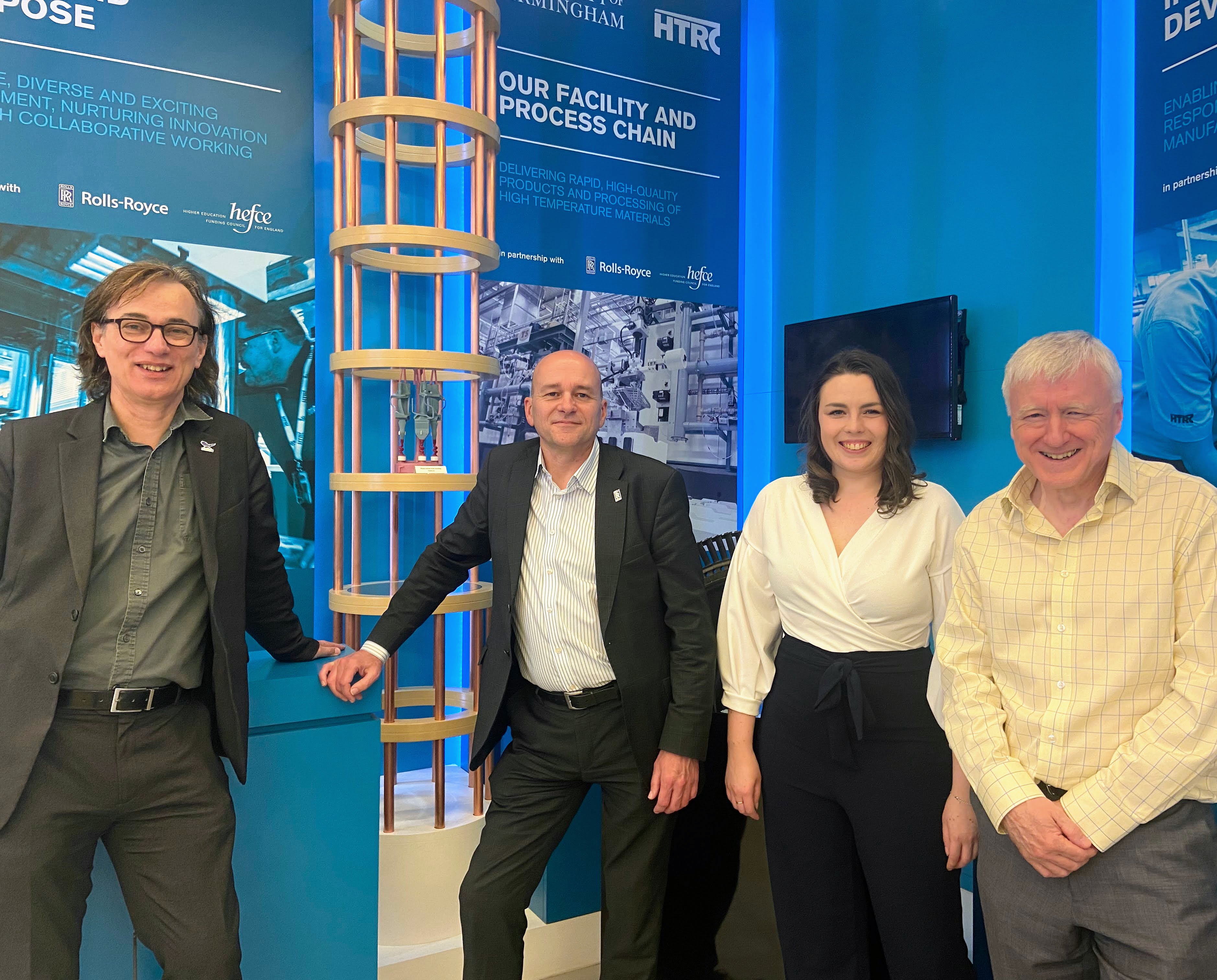 Advanced Metallic Alloys as the winner of the Bhattacharyya Award for 2022. The Award, which carries a £25,000 prize, has been presented in recognition of an exemplary academia-industry partnership that has helped to lead the UK’s work on creating safe, efficient, and sustainable aeroengines for the future.
Advanced Metallic Alloys as the winner of the Bhattacharyya Award for 2022. The Award, which carries a £25,000 prize, has been presented in recognition of an exemplary academia-industry partnership that has helped to lead the UK’s work on creating safe, efficient, and sustainable aeroengines for the future.
The Bhattacharyya Award is funded by the Department for Business, Energy and Industrial Strategy and was created to encourage more private and academic entities to collaborate, as a tribute to the late Professor Lord Kumar Bhattacharyya KT CBE FREng FRS, Regius Professor of Manufacturing at the University of Warwick and founder of WMG.
Dating back to 1989, the University of Birmingham-Rolls-Royce collaboration has enabled transformative advances in engine efficiencies - directly addressing environmental concerns, while also saving billions of pounds over 30 years of large fleet activity. Their partnership is at the heart of activities to develop and deliver the new engine technologies required to achieve or improve upon the ACARE Flightpath 2050 targets of 75% reduction in CO2 emissions and 90% reduction in NOx.
This industry-academia collaboration has seen extensive, continuous research into processes that are critical for maintaining a competitive and safe aerospace industry and cementing the UK as a leader in aeroengine architectures. These processes have included the enhancement of titanium and nickel disc alloys, development of new titanium aluminide alloys and single crystal turbine blade alloys for jet engines – all using advanced process and materials modelling.
Additionally, the partnership’s established High Temperature Research Centre is ideally placed for developing future aerospace technologies, including solutions for electrification of flight, hydrogen-powered aeroengines and use of alternative, sustainable aviation fuel.
Together, the University of Birmingham and Rolls-Royce partnership has significantly advanced metallurgy in the UK, built new infrastructure and promoted relationships between UK universities for over three decades. The partnership has also focused on developing future talent, having trained over 100 doctoral students in Birmingham who have joined Rolls-Royce as materials and manufacturing specialists.
Paul Bowen FREng, Feeney Professor of Metallurgy/Deputy-Pro-Vice-Chancellor (Industrial Partners) and Rolls-Royce University Technology Centre Director at the University of Birmingham, said: “Our team is immensely proud to win this award on behalf of two generations of researchers in our partnership. They have produced safe, efficient aero-engines and have delivered new technologies, new buildings and developed careers. Winning this award is a testimony to the unrivalled support that Rolls-Royce have provided to universities in support of the metallurgical base of the UK.”
Professor Dame Ann Dowling OM DBE FREng FRS, past-President of the Royal Academy of Engineering, and chair of the judging panel for the Bhattacharyya Award, said: “The University of Birmingham and Rolls-Royce’s partnership has contributed immensely to the UK’s aerospace industry. Together, they’ve embodied the spirit of the Bhattacharyya Award by promoting wider collaboration between industry and universities, and in developing the UK’s future talent.”
Margot James, Executive Chair at WMG, University of Warwick, said: “This partnership is a well-deserving winner and demonstrates the power of industry-academia collaboration to address a challenge as timely and as globally significant as sustainable aviation. We hope that this award celebrating Lord Bhattacharyya’s legacy continues to inspire future academics and industry partners to drive further co-operation, creativity, and innovation in the UK.
WMG’s SME group receive double award at the Technology Supply Chain Awards
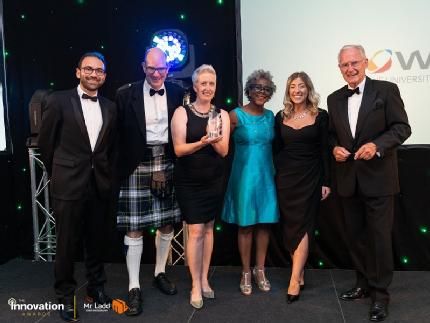 WMG’s SME group have been awarded as manufacturing innovation champions for their work with Midlands manufacturers at an awards ceremony held in Birmingham by membership group – the Technology Supply Chain.
WMG’s SME group have been awarded as manufacturing innovation champions for their work with Midlands manufacturers at an awards ceremony held in Birmingham by membership group – the Technology Supply Chain.
They were celebrated for the delivery of the DI4M (Digital Innovation for Manufacturing programme), a four-year project funded by the High Value Manufacturing Catapult and ERDF (European Regional Development Fund) to aid SME manufacturers adopt digital technology for increased productivity and profitability.
Over 300 businesses have already benefited from one-to-one project support from WMG experts to implement automation, new information systems, and digital manufacturing techniques with transformative results.
One of the beneficiaries of the programme, Daniel Robinson, Head of Finance, Operations & I.T, Gordon Ellis & Co said: “We’ve spent over 150 years in the industry. We know it well, however, we are looking to the future and need to use digital to continue to be innovative and competitive. WMG have the know-how in smart factories, and we got support that we wouldn’t have got anywhere else.”
Dr Mark Swift, Head of SME Programmes at WMG, University of Warwick said: “We are delighted to have received this award in recognition of our work with the Midlands manufacturing community. Our team cut through the technical jargon to get things done. From quick wins, helping businesses minimise waste in a process to longer term projects, implementing technology such as sensors and cameras to better track production throughput. The results can be transformational for businesses who are having to navigate some of the most challenging times.”
WMG were also jointly awarded the engineering innovation champion prize for delivery of the Made Smarter programme with partners at the Coventry and Warwickshire Growth LEP Hub, West Midlands Combined Authority and the Manufacturing Technology Centre (MTC).
WMG welcomes representatives from the Malaysia-UK Higher Education Collaboration Enrichment Programme
It was an honour to welcome guests from the Malaysia-UK Higher Education Collaboration Enrichment Programme (MY-UK HECEP), a flagship programme organised by the Malaysian Government, to WMG at the University of Warwick on Friday (23 September).
MY-UK HECEP started in 2018 with the aim of strengthening partnerships between universities in Malaysia and UK. The Programme brings together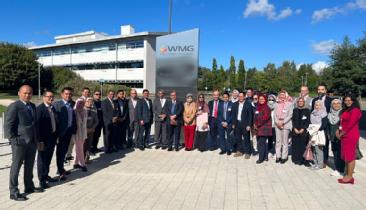 policymakers, academics, researchers, and university management to exchange best practice in the internationalisation of higher education.
policymakers, academics, researchers, and university management to exchange best practice in the internationalisation of higher education.
The universities in the programme work together on student and staff mobility, shared research, innovative curriculum development and digitalisation, doctoral training, transnational education (including Master's and PhD programmes), building industry relationships, and improving graduate employability.
The guests were met by Dr Kogi Balakrishnan, WMG’s Director of Client and Business Development (East Asia); before being introduced to Dr Ben Silverstone who explained more about WMG’s research capabilities and education programmes including the WMG Skills Centre.
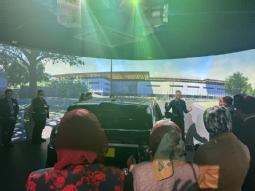 They were then shown the 3xD Simulator, the world's first immersive, simulated environment for smart and connected vehicles, before enjoying a guided tour of both the WMG Degree Apprenticeship Centre and the Energy Innovation Centre - where they heard more about WMG’s world leading battery research.
They were then shown the 3xD Simulator, the world's first immersive, simulated environment for smart and connected vehicles, before enjoying a guided tour of both the WMG Degree Apprenticeship Centre and the Energy Innovation Centre - where they heard more about WMG’s world leading battery research.
Alia Alias, Education Attache, High Commission of Malaysia, London said: “It was indeed an insightful tour and active engagement we had during the visit. The Ministry of Higher Education Malaysia is looking forward to strengthening the bridge between academics and industry with the model that WMG has established. The Malaysian university representatives have briefly discussed future collaboration, especially on research collaboration and staff attachment to integrate possible collaboration improvements that lead to innovation. Many thanks to WMG for hosting us and Dr Kogi for coordinating this fantastic visit and partnership.”
Dr Kogi Balakrishnan said: “High level strategic visits between academics, policy makers and technocrats focussed on exchange of innovative ideas and best practises between the UK and Malaysian institutions is an embodiment of the close bilateral educational and research ties between both our countries.”
World’s largest scenario database for Automated Vehicles is now open to public - Safety PoolTM Scenario Database
- Safety Pool™, led by WMG at the University of Warwick and Deepen AI, launches public access to the over 250,000 scenarios via a credit system
- Organisations can now earn credits for their scenario contributions to the database
- Credits can be used to access the entire set of scenarios in the database
- UK’s Vehicle Certification Agency is evaluating the use of Safety PoolTM as part of future type approvals of Automated Vehicles
Leading experts at WMG at the University of Warwick and Deepen AI, have launched credit-based access to the largest public store of scenarios for testing automated vehicles. The Safety Pool™ Scenario Database, features over 250,000 different scenarios. WMG and Deepen AI are also working with regulators internationally to help evaluate the safety of Automated Vehicles using the Safety PoolTM Scenario Database.
Safety remains one of the biggest challenges around self-driving vehicles. Driven by Safety PoolTM ’s vision of safety of self-driving vehicles being pre-competitive, the Safety PoolTM Scenario Database has created an ecosystem to enable sharing of test scenarios amongst organisations worldwide.
The database provides a large range of scenarios in different operational design domains (ODDs i.e., operating conditions) that can be leveraged by governments, industry, and academia alike to test and benchmark Automated Driving Systems (ADSs). Bolstered by scenarios generated by novel scenario generation methods: 1) knowledge-based and 2) data-based, a methodology also mentioned by the EU’s Regulatory Act on Automated Driving Systems, scenarios in Safety PoolTM are focused on uncovering failures in automated vehicles as they capture those edge-case scenarios.
Under the credit system, users are rewarded with credits for submitting scenarios to the database. Contributions are scored based on uniqueness of the scenarios and their validity, and corresponding credits are awarded to the organisation. These credits can be redeemed to gain access to more scenarios. This system encourages users to contribute to growing the database and making more scenarios available to the self-driving vehicle community.
Dr Siddartha Khastgir, Head of Verification & Validation, at WMG, University of Warwick, said: “With the public launch of the Safety Pool™ Scenario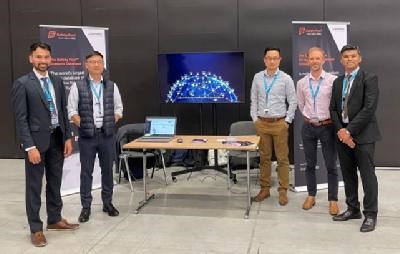 Database, we are democratizing critical data that was not easily available in the ecosystem. By aligning with international standards and working closely with regulators and developers in the UK and internationally, we are driven by the mission of making safety of automated vehicles pre-competitive.”
Database, we are democratizing critical data that was not easily available in the ecosystem. By aligning with international standards and working closely with regulators and developers in the UK and internationally, we are driven by the mission of making safety of automated vehicles pre-competitive.”
Jamie McFaden, Head of Automated Vehicle Technologies Group, Vehicle Certification Agency said: “The Vehicle Certification Agency, the UK’s Type Approval Authority, recognises the importance of ODD based testing and as a result is evaluating the use of Safety PoolTM Scenario Database as part of the Type Approval process for Automated Driving Systems.”
Coherent with our mission to align with international standards, today, each scenario has been launched in ASAM OpenScenario 1.1 and ASAM OpenDRIVE 1.6 formats. This provides further interoperability between stakeholders using ASAM OpenX standards for their simulation-based testing of automated vehicles.
The scenarios also cover a diverse set of ODD attributes and manoeuvre types such as urban environments, highways, and under varied environmental conditions where vehicles perform different manoeuvres such as cut-ins, overtaking etc. Use cases supported include Automated Lane Keeping Systems, low-speed shuttle, urban level 4, highway ADAS etc. Scenarios can also be efficiently searched using the ODD and Behaviour tags as per ASAM OpenLabel standard.
With Safety Pool™, industry, academic, industry and government experts come together to create the standards that will make the operation of automated vehicles safe everywhere. This builds an environment which enables the uptake of automated and autonomous technology in road vehicles.
Mohammad Musa, CEO, Deepen AI, said:
“By contributing and working within the Safety Pool™ framework, commercial stakeholders across AV fleet operators, OEMs, Tier 1 suppliers and all other Tier 2+ suppliers can massively accelerate verification & validation as well as share insights & edge cases that are very hard for a single stakeholder to collect by themselves.”
Eric Barbier, Head of Safety, Wayve said:
“Safety is core to the development of automated vehicles and everything we do at Wayve. As an industry, it is essential that we collaborate around a common ecosystem for safety assurance. Wayve is excited by the opportunity unlocked by the Safety Pool™ initiative and we look forward to leveraging its extensive database of curated scenarios.”
Since the launch of this pioneering project in March 2021, WMG at the University of Warwick and Deepen AI have collaborated with stakeholders around the world. To date, over 450 organisations have enrolled in the Safety PoolTM Scenario Database. The next step in WMG’s activity is working closely with regulators in the UK and internationally on enabling a safety assurance for automated vehicles through the Safety PoolTM Scenario Database.
Dr Maria J. Alonso, Lead, Automotive in the Software-Driven Era Initiative, World Economic Forum said:
“Collaboration among stakeholders is key to ensure that autonomous vehicles offer the highest possible levels of safety. The Safety PoolTM Scenario Database, with its over 250,000 scenarios and its collaborative approach, provides a platform to contribute to safer mobility on our roads.”
The development of the Safety Pool™ Scenario Database was funded by UK’s Centre for Connected & Autonomous Vehicles (CCAV), Innovate UK and Zenzic funded Midlands Future Mobility project led by WMG, University of Warwick. Furthermore, the WMG centre for High Value Manufacturing Catapult has further supported the continuous enhancements of the database with its support to the Verification & Validation team at WMG.
Notes to editors:
University of Warwick press office contact: Simmie Korotane | Media Relations | Press & Media Relations | University of Warwick | Email: Simmie.korotane@warwick.ac.uk
Useful Links:
Link to Safety PoolTM videos: https://youtu.be/edxw_VhzAYA
Link to Safety PoolTM website: https://www.safetypool.ai/
Link to Safety PoolTM Knowledge base: https://docs.safetypooldb.ai/
Tributes to Her Majesty The Queen from WMG's Executive Chair, Margot James and the Dean of WMG Professor Robin Clark
 Margot James, Executive Chair at WMG, University of Warwick: "All my colleagues at WMG will feel the loss of our Queen, each in their own personal way. I am sure I can speak for many though when I pay tribute to her life of dedicated service to our country and the Commonwealth. The Queen embodied the very best of Great Britain and Northern Ireland with her selfless sense of duty. The immense difference she made to our lives, she has been the only monarch we have ever known, will live with us forever. We send our deepest sympathy and condolences to all members of the Royal Family at this very sad time. Long live the King."
Margot James, Executive Chair at WMG, University of Warwick: "All my colleagues at WMG will feel the loss of our Queen, each in their own personal way. I am sure I can speak for many though when I pay tribute to her life of dedicated service to our country and the Commonwealth. The Queen embodied the very best of Great Britain and Northern Ireland with her selfless sense of duty. The immense difference she made to our lives, she has been the only monarch we have ever known, will live with us forever. We send our deepest sympathy and condolences to all members of the Royal Family at this very sad time. Long live the King."
Professor Robin Clark, Dean of WMG and Head of Department: "The death of Her Majesty The Queen is a solemn and poignant moment for our nation, the commonwealth and the world, and on behalf of all of us at WMG at the University of Warwick, I offer our heartfelt condolences to her family. Her Majesty’s dedicated and committed service to her people and to her country has been an example to generations in Britain, throughout the Commonwealth and across the world. The Queen’s life has been a shining light for us all throughout her momentous reign. Her Majesty has been an unwavering constant for so many of us – guiding the nation through times of challenge and times of celebration. We send our deepest sympathies to her family at this most difficult of times. At the same time, we are profoundly thankful for a life lived well, a life lived long and happily, and, most of all, a life lived in service to the nation."
WMG graduate recognised by leading professional body
Akzhunis Arystanbek, WMG Master’s in Supply Chain Logistics Management graduate, has won the Logistics Research Network Dissertation of the Year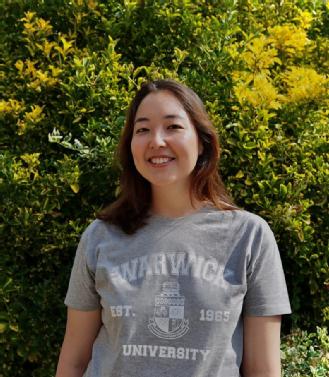 Award 2022 from the Charted Institute of Logistics and Transport (CILT).
Award 2022 from the Charted Institute of Logistics and Transport (CILT).
Akzhunis’s dissertation entitled “Implementation of Demand Sensing in Supply Chain Management” was nominated by Professor Dan Nunan, Director of full-time Postgraduate Programmes, at WMG at the University of Warwick.
The Awards are open to all UK students, and recognise outstanding dissertations at three levels – Bachelors, Master’s and PhD.
However, this year the panel of judges only awarded a prize in the Master’s category, with Akzhunis’s work being the only nomination that met the exceptional high standard required.
Akzhunis will be presented with her certificate and prize money at the Logistics Research Network Conference (LRN 2022) dinner and awards ceremony on the 8th September.
Alexa Kirkaldy, Associate Professor, at WMG, University of Warwick explains: “Akzhunis’s dissertation was nominated for this award, not only for its academic excellence, but also for the contemporary topic addressed which is essential to the future of world logistics and supply chain management.”
Akzhunis Arystanbek said: “It is a huge honour and pleasure for me to receive this award. My study involved an investigation into a very specialised area of supply chain management. When writing a dissertation, we all stand on the shoulders of giants.
“After graduating I moved on to continue my career in supply chain management at a metals and mining company in Kazakhstan.”
Akzhunis’s research was supervised by David Food, Industrial Fellow at WMG and Head of Supply Chain at Board International, who said: “Akzhunis was a thoroughly diligent and focussed researcher who delivered value and insight both through the creation of the data and in the interpretation of the results, delivering insights that would be commercially beneficial.”
Find out more about WMG’s Postgraduate Programmes here: WMG (University of Warwick) Full-time Master's (MSc) Programmes
Global challenge-tackling partnerships between industry and universities announced as Bhattacharyya Award finalists
- Six industry-academia partnerships from across the UK shortlisted for the annual Bhattacharyya Award including solutions for tsunami resilience, sustainable aviation, industrial decarbonisation, and cybersecurity
- Winning partnership to be announced at awards ceremony on 29 September 2022
- Applications for Bhattacharyya Award 2023 open until 16 December 2022
The Royal Academy of Engineering and WMG at the University of Warwick have shortlisted six exceptional industry-academia partnerships from across the UK for the second annual Bhattacharyya Award.
The Bhattacharyya Award and a cash prize of £25,000 will be presented to the team who best demonstrate how industry and universities can work together. The winning partnership will be announced on 29 September 2022.
The Bhattacharyya Award is a tribute to Professor Lord Kumar Bhattacharyya KT CBE FREng FRS, the Regius Professor of Manufacturing at the University of Warwick and founder of WMG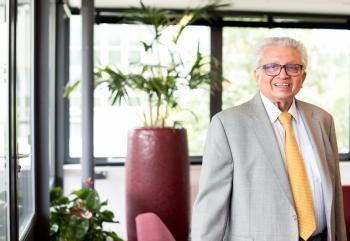 who advocated for greater collaboration between industry and universities. Funded by the Department for Business, Energy and Industrial Strategy, the annual Bhattacharyya Award is open to UK universities and colleges that have demonstrated a sustained, strategic industrial partnership that has benefitted society and is deserving of national recognition. Industry-academia partnerships from any academic discipline are eligible for the Bhattacharyya Award.
who advocated for greater collaboration between industry and universities. Funded by the Department for Business, Energy and Industrial Strategy, the annual Bhattacharyya Award is open to UK universities and colleges that have demonstrated a sustained, strategic industrial partnership that has benefitted society and is deserving of national recognition. Industry-academia partnerships from any academic discipline are eligible for the Bhattacharyya Award.
This year’s shortlist spotlights partnerships that address some of the most pressing challenges in the UK and globally, including coastal resilience against tsunamis, low carbon electricity supply, cybersecurity, sustainable aviation, and support for rail and steel industries.
The full shortlist of finalists is as follows:
· University of Birmingham and Rolls-Royce: Advanced Metallic Alloys
Dating back to 1989, this collaboration has enabled transformative advances in engine efficiencies - directly addressing environmental concerns, while also saving billions of pounds over 30 years of large fleet activity. The partnership is at the heart of activities to develop and deliver the new engine technologies required to achieve or better the ACARE Flightpath 2050 targets of 75% reduction in CO2 emissions and 90% reduction in NOx.
· University of Cambridge and ARM: Digital Security by Design
This partnership focuses on redesigning the architecture that integrates both hardware and software with technology that will fundamentally improve cyber security. This new architecture, known as CHERI (Capability Hardware Enhanced RISC Instructions), could stop around two thirds of hacks, cyber-attacks and data breaches, according to Microsoft. The partnership launched a prototype known as Morello, which has been adopted by the UK government’s Digital Security Design programme and is being rolled out to industry and academia for wide-scale testing and development.
· Imperial College London and Transport Strategy Centre: Optimising Transport Systems
The Centre’s focus on urban transport systems has become increasingly important as the world attempts to tackle the challenges of climate change and transport-related air pollution. Its work has provided over £1.5 billion worth of benefits to the rail industry over the last 15 years. The Centre’s research and collaboration has benefitted 125 major transport providers in the UK and globally – influencing funding policy, improving cost efficiency, service quality, and safety, and helping transport operators respond to Covid-19.
· University of Manchester and National Grid: Impacts to Electricity Networks
By providing low carbon electricity, this partnership has delivered significant CO2 reductions, increased productivity, stimulated large investment in new jobs and engineering activity in the UK, and supported the growth of many SMEs. Knowledge generated by the partnership has provided cost savings of approximately £11 million to the UK energy network and helped to develop many key projects - including the T-Pylon in Somerset that delivers power to six million homes.
· Swansea University and Steel Strategic Alliance: Sustainable Steelmaking
This partnership aims to help the UK to become a leader in sustainable steelmaking, with a focus on decarbonising the whole manufacturing supply chain. Some of its major projects include the creation of the Materials and Manufacturing Academy, that provides industry-led postgraduate training, the Steel and Metals Institute, providing advanced steel testing, and the SUSTAIN Future Manufacturing Research Hub, that develops carbon-neutral steel supply chains and sustainable solutions for transport, energy and buildings.
· University College London, HR Wallingford and Arup: Advanced Tsunami Engineering
This collaboration began following the 2004 Indian Ocean Tsunami, which killed more than 250,000 people and caused widespread destruction. The partnership led to the creation of a new tsunami simulator, unique worldwide for its ability to recreate realistic representations of tsunamis. The partnership’s work has improved knowledge of tsunami interaction with coastal environments, developed emergency evacuation protocols and provided tsunami assessments in the UK, including for the Wylfa Newydd nuclear plant project in North Wales, as well as internationally.
Professor Dame Ann Dowling OM DBE FREng FRS, former President of the Royal Academy of Engineering and Chair of the judging panel for the Bhattacharyya Award, said: “All six shortlisted partnerships are excellent examples of industry-academia collaboration, with timely and innovative responses to some of the most challenging issues facing society today. It is a privilege to showcase these successful collaborations and we hope that doing so fosters even greater connection between industry and academia in the UK.”
Margot James, Executive Chair of WMG, University of Warwick, said: “It’s great to see the extremely high quality of industry-academia partnerships shortlisted for the second annual Bhattacharyya Award. As a celebration of Lord Bhattacharyya’s legacy, the Award continues to highlight how building symmetry between academia and industry is so vital for meeting the needs of society, and adapting to global challenges. We look forward to seeing which collaboration is selected as the overall winner.”
The winner of the Bhattacharyya Award will be announced on Thursday 29 September 2022, at an event showcasing the shortlisted partnerships at the University of Warwick.
Those wishing to attend the Bhattacharyya Award ceremony can register via the Academy’s website.
Applications for Bhattacharyya Award 2023 are now open until 16 December 2022 and can be submitted via the Academy’s online grant system.
Notes for Editors
For media enquiries please contact: Chris Urquhart at the Royal Academy of Engineering Tel. +44 207 766 0725; email: Chris.Urquhart@raeng.org.uk
WMG welcomes representatives from the Steel All-Party Parliamentary Group
It was an honour to welcome Stephen Kinnock MP and Jessica Morden MP, Chair and Vice Chair respectively, of the Steel All-Party Parliamentary Group (APPG), to WMG at the University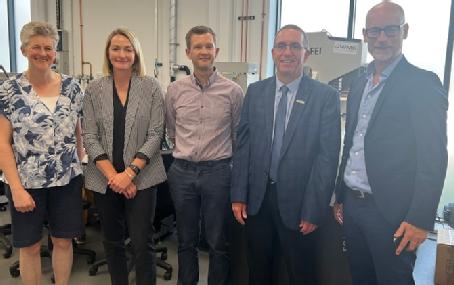 of Warwick this week.
of Warwick this week.
The guests were met by Professor Claire Davis and Dr Russell Hall from the Advanced Steel Research Centre, and Dean of WMG, Professor Robin Clark.
They enjoyed a tour of the Advanced Materials and Manufacturing Centre (AMMC), home to WMG’s world-class steels research facilities, where they heard more about WMG’s work to support the steel industry including the importance of green steel production for a sustainable future.
Stephen Kinnock MP Chair of the Steel APPG and Jessica Morden MPVice Chair of the Steel APPG commented: “It was great to visit Claire Davis and her team at WMG's Advanced Materials Manufacturing Centre to see for ourselves the industrial research and development they're working on with the UK Steel sector, including cutting the cost of developing new steel alloys, deploying alternative fuels for green steel production or converting scrap steel to high value products.
“Innovation has a crucial role in improving the quality of UK steel production, reducing energy costs and making UK steel sustainable and it was heartening to see academics and industry working together on these critical issues for the future of UK steel, which is so important for our country."
Professor Claire Davis said: “Stephen and Jess were really interested in hearing about the work we do in the Advanced Steel Research Centre. It was great to show them examples of our fundamental and applied research supporting the development of new steel processing and alloys, and the impact it has for the UK steel industry. It is a very exciting, and challenging time to be working on steel due to the pace of change as we move to green steel production.”
Find out more about WMG’s Steels Processing research here: Steels processing (warwick.ac.uk)
Student projects help graduates to develop key employability skills
WMG, at the University of Warwick, is committed to supporting a variety of undergraduate student projects with connections to industry partners.
Each student project is supported and supervised by WMG Precision Engineer Dave Cooper, who has a background working for Honda Racing, and Lead Engineer Malcolm Swain, who specialises in electric vehicle battery technology.
The projects also engage with WMG PhD students; academics; technicians and industry sponsors. Students gain valuable practical and project management skills by being assigned an area of responsibility, from engineering and technical lead to marketing and sales support.
The student-led projects help to develop time and management skills; teamwork; and give practical hands-on experience.
While WMG provides some seed funding, it is the responsibility of the students to secure sponsors and funding, learning valuable networking, negotiation, sales and partnership skills along the way.
2022 student project teams
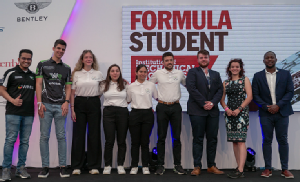 The Warwick Racing team entered the IMeche Formula Student Concept Class event at Silverstone to assess their new concept for an in-house built chassis. The judges, including an engineer from Mercedes F1 chassis team, were very positive about its ease of manufacture, lightweight, functionality, recyclability and cost saving design. The team is now developing the chassis based on the judges’ feedback to test its feasibility in the next electric racing car.
The Warwick Racing team entered the IMeche Formula Student Concept Class event at Silverstone to assess their new concept for an in-house built chassis. The judges, including an engineer from Mercedes F1 chassis team, were very positive about its ease of manufacture, lightweight, functionality, recyclability and cost saving design. The team is now developing the chassis based on the judges’ feedback to test its feasibility in the next electric racing car.
The Warwick Racing Business team was awarded second place for its business presentation out of 51 top global universities. The event follows a similar format to Dragon's Den, with the students developing a business idea, plan and model for producing the electric racing car to sell. This is an extremely challenging event and the team have high hopes to win first place next year.
In the Warwick Moto team, student technical lead Nesta Ferguson, was awarded the Best Dissertation Project Award, by the Institute of Mechanical Engineering, and recognised as a runner-up in the Engineering Undergraduate Innovation Award category. The Team’s research outputs were also accepted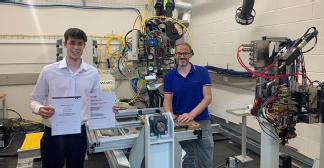 for publication by the flagship ICALEO conference and then promoted to the Journal of Laser Applications. Aneesh Jois, who also played a leading role in the Warwick Moto team, won Institution Best Student on the Mechanical Engineering Bachelor’s degree for academic achievement. Aneesh highlighted how invaluable his Warwick Moto project experience has been in learning how to design components for use in the real world and enabling him to achieve higher grades in application-based engineering modules.
for publication by the flagship ICALEO conference and then promoted to the Journal of Laser Applications. Aneesh Jois, who also played a leading role in the Warwick Moto team, won Institution Best Student on the Mechanical Engineering Bachelor’s degree for academic achievement. Aneesh highlighted how invaluable his Warwick Moto project experience has been in learning how to design components for use in the real world and enabling him to achieve higher grades in application-based engineering modules.
The Warwick Robotics team worked with Dr Rachel Edwards, in the Department of Physics at the University of Warwick, to develop two wall climbing robots which perform Non-Destructive Testing (NDT) on steel structures such as storage tanks and wind turbine towers. The twin robots work in tandem carrying an electromagnetic acoustic transducer (EMAT), one with the receiver and one with the transmitter. To achieve the best results quickly the two robots must climb the structures with the transmitter and receiver aligned with each other at various distances apart. The students designed, built and tested a system that did this automatically in real-time using high resolution cameras and fiducial markers achieving +/-0.45degree accuracy. This will revolutionise industrial applications of NDT where this was considered not viable in the past.
Lee-Rose Jordan, Project Manager at WMG, University of Warwick explained: “These projects are a great example of how students can develop valuable hands-on engineering knowledge and skills, standing them in good stead as they embark on their chosen careers in some of the most esteemed companies in the world. This year, for example, some of our students have gone on to work at Delta Cosworth, Williams Advanced Engineering, McLaren Applied, Triumph, Alpine F1 and Mercedes.”
Find out more about the student projects here: Student Led Projects (warwick.ac.uk)
